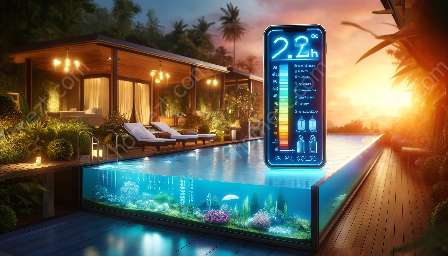Water temperature regulation is a crucial aspect of spa maintenance and the operation of swimming pools and spas. It plays a significant role in ensuring optimal comfort, safety, and hygiene for users.
Importance of Water Temperature Regulation
Water temperature regulation is essential in maintaining a pleasant and relaxing experience for spa and pool goers. It impacts the overall comfort, relaxation, and therapeutic effects of the water, influencing the satisfaction of users.
Regulating the water temperature also contributes to the safety of individuals using the facilities. Proper temperature control helps prevent discomfort, overheating, or hypothermia, especially during extended periods of use.
Furthermore, maintaining the ideal water temperature is critical for ensuring proper chemical balance and efficient filtration, promoting clean and sanitary conditions in spas and swimming pools.
Factors Affecting Water Temperature
Several factors influence water temperature in spa maintenance and swimming pools. Understanding these factors is essential for effective temperature regulation:
- Climate Conditions: External temperature fluctuations, sunlight exposure, and weather patterns can impact the water temperature, requiring adjustments to maintain desired levels.
- Equipment Efficiency: The performance and efficiency of heating and cooling systems, such as heaters, chillers, and heat exchangers, significantly impact water temperature regulation.
- User Preferences: Different users may have varying temperature preferences, necessitating flexibility in maintaining a suitable range to accommodate diverse needs.
- Regulatory Guidelines: Compliance with industry standards and health regulations, which often specify recommended temperature ranges for spa and pool water, is crucial for maintaining safe and legal operations.
- Usage Patterns: The frequency and duration of spa and pool usage can influence water temperature, requiring adjustments to accommodate varying occupancy levels.
Maintaining Ideal Water Temperature
Effective maintenance of water temperature involves proper equipment upkeep, monitoring, and operational practices:
- Regular Equipment Inspections: Routine inspections and servicing of heating, cooling, and circulation equipment are essential to ensure optimal performance and energy efficiency.
- Temperature Monitoring: Utilizing reliable temperature monitoring systems and sensors enables real-time tracking of water temperature, allowing prompt adjustments as needed.
- Calibration and Settings: Periodic calibration and adjustment of temperature control settings help maintain accurate and consistent water temperatures within the desired range.
- Water Balancing: Maintaining proper chemical balance and pH levels in the water is crucial for inhibiting bacterial growth and ensuring the effectiveness of temperature regulation systems.
- Staff Training: Providing comprehensive training to spa and pool staff on maintaining water temperature and responding to temperature-related issues is vital for efficient operations and user satisfaction.
Conclusion
Water temperature regulation is a fundamental aspect of spa maintenance and the management of swimming pools and spas. By recognizing the importance of temperature control, understanding the influencing factors, and implementing effective maintenance practices, facilities can ensure a comfortable, safe, and enjoyable experience for their patrons while upholding high standards of cleanliness and hygiene.



